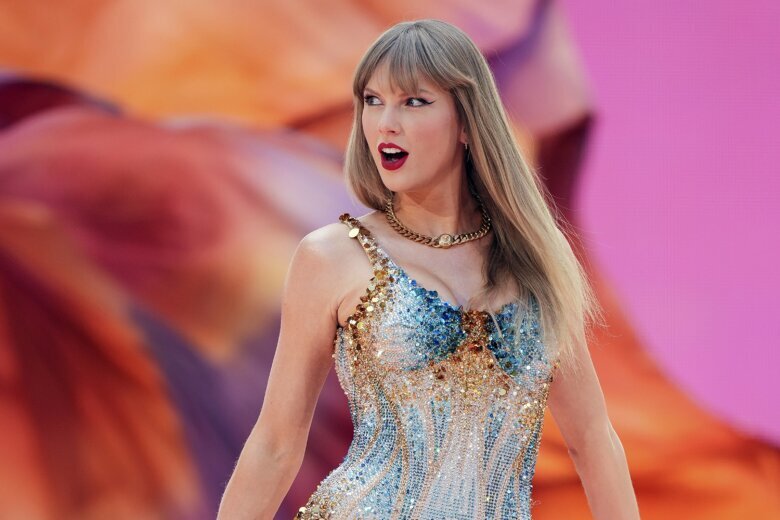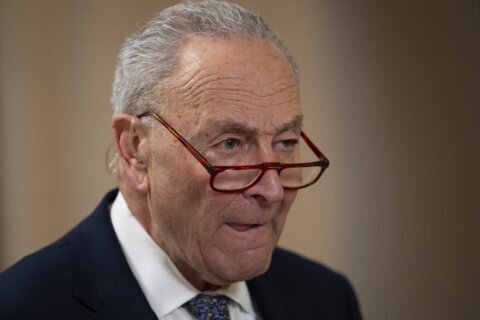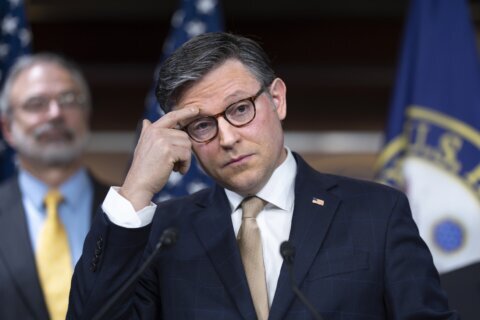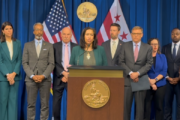- Visit WTOP’s Election 2024 page for our comprehensive coverage.
- WATCH: Democratic National Convention proceedings in Chicago
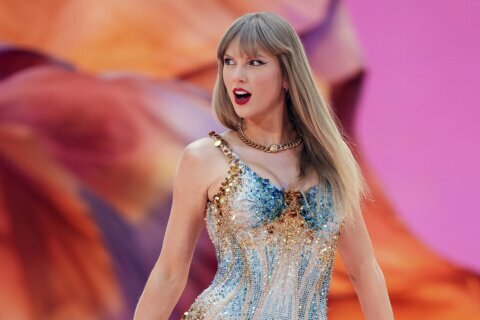
WASHINGTON (AP) — Former President Donald Trump has been active on his social accounts as Democrats gather for their convention in Chicago, but some of his posts don’t have much to do with reality.
Ahead of the Democratic National Convention, he posted a fake image of someone who looks like Vice President Kamala Harris addressing what appears to be a communist rally in Chicago with a depiction of a red banner with a communist symbol. That followed his repost of a phony video of himself dancing next to billionaire Elon Musk, one of his most vocal supporters.
Just before the convention kicked off, he reposted an image of Taylor Swift in an Uncle Sam outfit and accepted her endorsement for his campaign, which she had never given.
They’re the latest examples of how Trump is promoting images produced by artificial intelligence tools to attack his opponents or create illusions of support around his own campaign. It’s in keeping with a long-standing strategy in which Trump amplifies messages – from QAnon adherents to those who deny the results of fair elections — to score political points and satisfy his base by promoting alternate realities.
Some of the images and videos Trump has shared are cartoonish or obviously fake. Yet the rise in AI-generated content across political social media concerns experts who say it can be used to push more insidious and believable disinformation. As fake images, videos and audio clips created by generative AI models begin to saturate social media, they also risk eroding people’s trust in what they see and hear.
“The AI-generated deepfakes of Taylor Swift are yet another example of AI’s power to create misinformation that deceives and defrauds voters,” said Lisa Gilbert, co-president of Public Citizen, a progressive consumer rights advocacy group that has pushed for legislation to regulate AI. “The potential harms to our society that could result from such misinformation, including abuses of our elections, are wide-reaching and immensely damaging.”
One AI-generated image in Trump’s Truth Social post, shared on Sunday, showed women in “Swifties for Trump” shirts, a reference to the artist’s devout fans. The fake image showing Swift dressed as Uncle Sam included text saying, “Taylor wants YOU to VOTE for DONALD TRUMP.” In his repost of the image, Trump added, “I accept!”
One of the images Trump shared included a small satire label, though he didn’t clarify whether he meant his post was in jest.
Swift, who remains on her world tour and has a show scheduled Tuesday night in London, has made no endorsement in this year’s U.S. presidential race. Her spokesperson did not return multiple messages seeking comment.
To Republicans outside Trump’s orbit, the focus on someone like Swift — one of the most talked about artists in the world — is all about garnering attention for Trump at a time when much of the focus is on Harris and Democrats.
“This is how he and the campaign can wrest back news cycles,” said Doug Heye, a longtime Republican spokesperson and operative. “I hesitate to say to their credit, but I think we all know, if you want to be talked about, Taylor Swift is a great way to do it.”
A Harris spokesperson did not respond to questions about Trump’s use of images generated by artificial intelligence.
Trump supporters frequently create social media posts and memes using AI-generated images, some of which get shared by the former president.
Before Trump shared the phony Swift images, his supporters had been creating and posting their own AI-generated videos and images of the pop star appearing to support Trump. They also shared numerous images of Harris dressed as a communist leader or addressing a Soviet crowd.
Political operatives have long been concerned about what the rise in artificial intelligence could mean for elections.
Some members of Congress have pushed for legislation to regulate the use of AI-generated images in politics, but no legislation to do so has gotten close to passing. The Federal Communications Commission has proposed requiring political advertisers to disclose their use of artificial intelligence in television and radio ads, but such a rule would not affect the social media platforms.
While several social media companies have rules for labeling AI-generated content, they aren’t always followed. Across platforms, misleading and lifelike images of both Trump and Harris amass millions of views, with some users not recognizing what they are seeing is fake.
Given her influence and millions of fans, Swift has often become a trending political topic during election years.
In 2020, she supported President Joe Biden, writing a month before the election that she was going to be cheering for then-vice presidential nominee Harris, this year’s Democratic nominee, in her debate against then-Vice President Mike Pence. She also was openly critical of Trump ahead of the 2020 election, saying he had stoked “the fires of white supremacy and racism.”
While she has remained on the sidelines so far this year, she has not escaped notice from prominent conservatives who worry about a Swift endorsement of the Democratic presidential ticket.
Fox News’ Jeanine Pirro earlier this year warned Swift not to “get involved in politics.” Fox News’ Sean Hannity urged her to “think twice” about backing Biden when he was running for reelection. And Vivek Ramaswamy, a former GOP presidential candidate and vocal Trump supporter, called Swift and her NFL star boyfriend Travis Kelce “an artificially culturally propped-up couple” who may make “a major presidential endorsement” this fall.
Some of her supporters have responded to Trump’s posts by taking to social media and declaring their intentions to vote for the former president. Trump’s campaign is seizing on that support.
Steven Cheung, Trump’s spokesman, did not address the use of fake images in response to questions, but called “Swifties for Trump” a “massive movement that grows bigger every single day.”
___
Swenson reported from New York.
___
The Associated Press receives financial assistance from the Omidyar Network to support coverage of artificial intelligence and its impact on society. AP is solely responsible for all content. Find AP’s standards for working with philanthropies, a list of supporters and funded coverage areas at AP.org
___
The Associated Press receives support from several private foundations to enhance its explanatory coverage of elections and democracy. See more about AP’s democracy initiative here. The AP is solely responsible for all content.
Copyright © 2025 The Associated Press. All rights reserved. This material may not be published, broadcast, written or redistributed.

